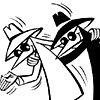![]()
Phew! It’s been a whirlwind of a summer, and now we have a new season: Summall. Or, possibly, Summinter. We’re experiencing unusually warm weather[1], and that has put a significant dent in my combat boot-wearing capabilities. Great for Pokemon hunting, though, and getting steps in. I’m pretty stoked because I hit the first leg of my goals, and am amping up to the next phase.
Part of my good mood right now, is because I took my own advice and did several things on my tips for self-care list. I am devastated and upset by the news, but I keep coming back to what I can do. What can I provide? Make art in all its glorious forms. Give back as I’m able to. I know it won’t be enough, but I’m not an island either. I work with fabulous individuals, and we’re all doing the best we can and will continue to do so.
My workload is insane at the moment. There is no way I can participate in NaNoWriMo, either. Timing, such as it is, means my focus has to be very narrow right now. Some exciting bits I’m working on, for sure! I’ve had a lot of conversations about launching additional aspects, too, such as Patreon or Etsy. Next year is going to be awesome!
I am a little concerned, however, that social media engagement is changing because it directly impacts the discovery of creators and our art. It’s a lot more work to promote a book or game than it has been in the past; people are getting offline and definitely adjusting their usage. Can you blame them? Every time something blows up in a headline, social media is saturated with commentary about it. It’s inescapable.
Despite this, I’m not worried about marketing. To be honest, that hasn’t been on my radar for a long while. When I have blogged about social media/marketing in the past, it’s partly because I feel that sharing stories about my journey might help others in my position. Too, there’s really no “one way” to promote yourself or your books, and there are plenty of experts in the field–many already work in publishing, already. I’m lucky in the sense that I’ve logged some time in the marketing field before, and know who to ask if that responsibility falls back on my plate. Often, however, making art has been a higher priority than selling it.
Some immediate changes to my schedule: I’m back to blogging, at least twice a week, for the time being. I’ve also found that compartmentalizing my To-Do lists has been a life-saver. And, it has really helped me prioritize what needs to be done as well. Really slick! I’ll also be taking photos at events and whatnot, and I have a lot to share from past shows/fun bits! I played around with how I log my time, and I’m definitely blocking social media during business hours. It’s a huge relief, and those mini-breaks I normally take are a lot more productive and fun. Great fuel for writing. This technique has also been helping me compartmentalize how and when to channel my energy, too.
And with that, I need to get back to my list. Keep on, keepin’ on. Be well!
1] A former co-worker used to call it ‘global nicening’ as a terrible joke. Climate change is the new Flat Earth.
Mood: Have devolved into sarcasm. Or evolved? Hah.
Caffeinated Beverages Consumed: Wait… That was Sunday, right? Three.
Work-Out Minutes Logged Yesterday: Steps! Steps! Steps!
In My Ears: How Far I’ll Go from Moana (Alessia Cara version)
Game Last Played: Pokémon Go
Book Last Read: Loads for work. Loads. LOADS MORE. MOAR.
Movie/TV Show Last Viewed: The Magnificent Seven YUS!
Latest Artistic Project: Make Art Not War Challenge eBook now available!
Latest Releases: Over the Edge for Dungeons & Dragons 5th Edition, Dagger of Spiragos for Scarred Lands.
Current State of Projects: Read my latest project update. New project update coming when I get time.



 This should be a no-brainer, but for someone like me who’s required to use her brain a lot… Well, it’s surprising how easy it is to forget about health-related matters. Like the things I want to do, they have to be done. But, unlike a necklace I design or a song I play, the benefits aren’t always immediate. By putting it on my to-do list, I’m reminding myself to do it today, not tomorrow.
This should be a no-brainer, but for someone like me who’s required to use her brain a lot… Well, it’s surprising how easy it is to forget about health-related matters. Like the things I want to do, they have to be done. But, unlike a necklace I design or a song I play, the benefits aren’t always immediate. By putting it on my to-do list, I’m reminding myself to do it today, not tomorrow.